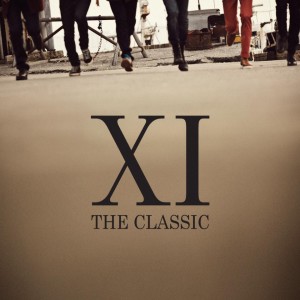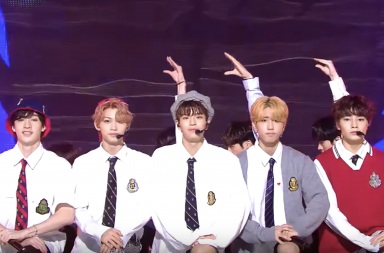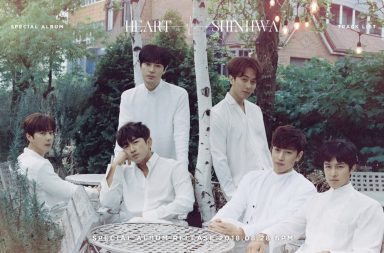Production, Conviction, and Cohesion are three traits that I firmly believe to be the only requirements to a well-crafted album. It may not be a superior album per sé, but I guarantee that it will at least be above average. Why? Because fulfilling those three qualities takes effort, despite my ability to easily list them off. It also goes to show that you don’t need extraordinary singers, or rappers to release an extremely successful album, and this holds especially true in a genre as versatile as pop music, where technical singing isn’t given a lot of emphasis.
Shinhwa happens to be a group that really understands and embraces this concept. They don’t necessarily have the biggest voices or “the best” rappers in the world, nor do they release the highest caliber of music. However, they do take full advantage of the talent that they have and devote their energy to the standard of music they put out. And when I say what they end up releasing is quality music, I really mean quality. The Return was enough to prove that to me.
Nevertheless, it takes certainly takes conviction and maybe even some pretension to name your album The Classic; yet Shinhwa had the audacity to do such at thing for their follow-up to The Return. I for one, was intrigued by this. Trying to embody something as powerful as the word “Classic” in music is either: one, going to lead to chastising the album’s impudence; or two, having to open a new space among the revered. And after listening to the album many times over, I’m surprised to say that The Classic has found its place in the netherworld.
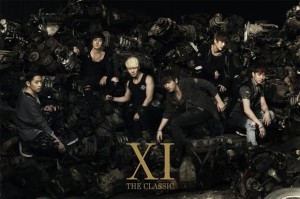 The moment I heard the opening chords of “그래 (That’s Right),” I knew Shinhwa was going in the right direction; that classic (there goes that pesky word again) guitar line is an impeccable way to start an album. I haven’t seen an album start out the way The Classic just has in a long time. “그래” is a song with force, though there isn’t a moment where it makes itself bigger than it is. Therefore, it’s not surprising that the song has worked its way up to being my favorite song in the album.It has a very simplistic melodic structure, but the incredible instrumentation and production of this song takes it to a whole new level (to the point that it’s impossible for the live performances to live up to the recorded version).
The moment I heard the opening chords of “그래 (That’s Right),” I knew Shinhwa was going in the right direction; that classic (there goes that pesky word again) guitar line is an impeccable way to start an album. I haven’t seen an album start out the way The Classic just has in a long time. “그래” is a song with force, though there isn’t a moment where it makes itself bigger than it is. Therefore, it’s not surprising that the song has worked its way up to being my favorite song in the album.It has a very simplistic melodic structure, but the incredible instrumentation and production of this song takes it to a whole new level (to the point that it’s impossible for the live performances to live up to the recorded version).
I thought that this kind of production was relegated to big name companies (like YG and SM with cash to burn) but Shinhwa Company are giving the Big Three a run for their money. I love how the trade-offs between Min-woo, Hye-sung, and Dong-wan keep the enunciation and phrasing consistent, letting the natural timbre of their voices be the distinguishing factor between the three and the color in the song. The vocals are also kept at a level where there is sufficient blending between the vocals and the instrumentals while maintaining the integrity of each as well. This is especially true at the end where they have everyone harmonizing in the chorus—it’s so good, I can’t stop gushing over it.
Normally, people wouldn’t have placed “아는 남자 (Acquainted Guy)” as the second song in an album since it sounds so much like a “latter-half” song that the logical choice would be to put it at the end. I know that I would have. The ironic part about “아는 남자” is that it’s so ridiculously cliched, in retrospect I’m totally happy that Shinhwa didn’t do the obvious thing and put it at the end. There really isn’t much to say about “아는 남자” otherwise, because the song is as inoffensive as you can get. You just can’t hate the melody, and the production quality is great as always.
 This probably would be a good time to discuss the music video for “This Love,” which was made by the director of “Gangnam Style” (though I honestly don’t see what he did that was so special) and included Japanese actress Fujii Mina. Lindsay described it as “Thirty, Flirty and Thriving” which is totally accurate because I don’t know how in the world Shinhwa could pull off voguing for such a fist-pumping kind of song — but they did, somehow. If there was a time where conviction determined the difference between good and terrible, this would be it. I know very little about dance, but when I first saw the choreography for “This Love,” I was laughing my head off at all the feminine posing and dance moves (which I didn’t know was voguing at the time) that serious faced thirty-year-old men were trying to do in ridiculous looking patterned suits.
This probably would be a good time to discuss the music video for “This Love,” which was made by the director of “Gangnam Style” (though I honestly don’t see what he did that was so special) and included Japanese actress Fujii Mina. Lindsay described it as “Thirty, Flirty and Thriving” which is totally accurate because I don’t know how in the world Shinhwa could pull off voguing for such a fist-pumping kind of song — but they did, somehow. If there was a time where conviction determined the difference between good and terrible, this would be it. I know very little about dance, but when I first saw the choreography for “This Love,” I was laughing my head off at all the feminine posing and dance moves (which I didn’t know was voguing at the time) that serious faced thirty-year-old men were trying to do in ridiculous looking patterned suits.
…That is, until I noticed Eric at about the two-minute mark. That man-made the dance look so fabulous and sensual, I literally stopped laughing right there. It was just conviction from Eric and the rest of Shinhwa folks, that sold me. Upon watching the MV several more times, the dance did grow on me, and I’ve come to appreciate the artistry of the visual lines and delicate hand motions coupled with the intense dance and presentation. It really matches the contrast between delicate melody and dance beats within the song. (I also have to admit that it was blatantly sexist to find the style unnatural for a manly group.) Indeed, “Thirty, Flirty and Thriving” is exactly the right descriptor for this song and MV— Lindsay, I couldn’t have said it better myself.
[youtube http://www.youtube.com/watch?v=45wH_HHnJBg]“This Love” isn’t a stand-out song in the traditional sense; however, it is a song that establishes Shinhwa’s relevancy in an electronic pop world. It’s also immensely catchy. What started out as a song I listened to due to falling in love with the stunning but simple piano as well as Hye-sung and Min-woo’s melodic intro, closer, and pre chorus, quickly became my guilty pleasure. Though I’m not normally a House or Club-music fan, Perhaps, the selling point of this song despite the generic construction, is its restraint and fluidity. The beat is never abrasive, the piano and vocals are delicate and melodic, and the chorus never quite explodes in your face. A small detail to be appreciated was the delivery of the last lines of the song, where they just float in to the distance and hark back to the beginning. Andrew Jackson, I have to hand it to you: I’m now a huge fan of your consistency in bringing out the classy to a run of the mill musical framework.
And then we hit a bit of a road block in the album called “Scarface.” It’s really unfortunate because it’s not like any one element is particularly bad. The problem arises when you try to smash all the pieces together. Let me make it clear, it’s not the “I Got A Boy” kind of disaster where a song tries to be five songs at once and just doesn’t make sense; it’s more like finishing a puzzle where pieces don’t quite fit right, such that you see cracks all over the place and you get really annoyed because you know what you want it to be, and it will never quite get there. That frustration may be a result of my personal preference in music, which basically comes down to strong melody, fluidity, and proper layering. Nevertheless, the dubstep is extremely discordant against everything else and the transitions are a little abrupt between song elements. Sure, after listening to it six or so times, it does get easier to palate the song; regardless, that doesn’t change the messy composition/arrangement that pervades this song. That’s not to say that there are no positives, which include the pre-chorus and bridge, but most of it is meh.
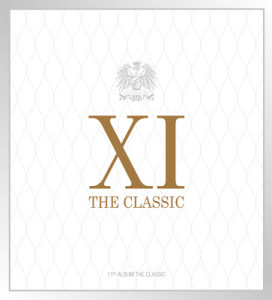 Coming off the more experimental and modern “Scarface” is “New Me” and “웃다가… (Laughing…).” The reason I clump these two songs is that they’re both so fundamentally K-pop that I can’t help putting the two together. The best part about these songs is that they hit every component of a classic boy-band pop song successful to a “T”; consistent harmonizations, a soaring upper line, a strong but not overbearing piano line, a beat that serves clear undercurrent, an easy to follow melody, a restrained and smooth rap, and a powerful bridge with a climatic ad lib.
Coming off the more experimental and modern “Scarface” is “New Me” and “웃다가… (Laughing…).” The reason I clump these two songs is that they’re both so fundamentally K-pop that I can’t help putting the two together. The best part about these songs is that they hit every component of a classic boy-band pop song successful to a “T”; consistent harmonizations, a soaring upper line, a strong but not overbearing piano line, a beat that serves clear undercurrent, an easy to follow melody, a restrained and smooth rap, and a powerful bridge with a climatic ad lib.
Speaking of ad-libs, you would not believe my elation at hearing the ad-libs from “웃다가…” If you read my review about 2PM’s recent album, I was pretty upset at how Jun.K’s ad-libs in “A.D.T.O.Y” were written, because frankly, they were flat and ran over all the build up of the song. In “웃다가… (Laughing…),” however, they were perfect.Ad-libs these days are just about seeing how well your lead singer can hold on to a single note ad nauseam, and seriously: that’s boring, and I don’t feel anything from it. The whole point of having an ad-lib is to give color, climax and dimension to the melody of the song, like how Hye-sung’s ad-lib just floated over the main melody running parallel to it and harmonizing with everything else in the song.
Next is my second favorite of the album, the retro throwback “마네킹 (Mannequin).” I confess that I have a soft spot for retro songs that almost everyone else doesn’t, but that doesn’t change how laid-back and jazzy this song is. And coming from our resident 1st generation K-pop group, this song could not be more appropriate or well executed. The production and arrangement are once more huge components of the success of the song, especially when it comes to how much layering there is and how full and dense “마네킹 (Mannequin)” sounds. Really though, let me know when you find another song more carefree retro than this one, because this doesn’t come by everyday.
[youtube http://www.youtube.com/watch?v=Xjn65Jp1XWI&w=560&h=315]“Hurricane” is the second stumbling point of this album. Throughout The Classic, Shinhwa has been grasping firmly onto the sophisticated pop music theme. With that concept, seeing the juvenile “Hurricane” with that weird squeaky siren thing in the excessively loud and shouting chorus coupled with the whiplash effect you get out of the arrangement of the song is rather jarring. I guess it fits with the “Hurricane” imagery, but the song is really quite lackluster given the rest of the album. Yes, like “Scarface,” it does grow on you, and if you’re a fan of this kind of song, you’ll like it regardless. However, thematically, it doesn’t fit into the album as well as it could.
“I Gave You” does slow down things a tad, but it doesn’t drop the forward momentum. The bongo-like drums (I really can’t tell what it is exactly) is a nice touch to the song. Especially after the whirlwind ear-blast that is “Hurricane,” I’m happy to see an acoustically dominant song. It’s soft and smooth, and by now, I might as well become a Min-woo and Hye-sung stan, because I can’t deny how much I love how they harmonize in this song. I’m not going to attempt to say any more about “I Gave You,” because it will just be me fangirling over the two of them.
Cheesy can’t get any cheesier than “Love Song,” (even the name is cheesy!) but I enjoyed every second of it. If there is a song on this album that calls back to K-pop of another era, it would be this song. I really can’t think of a more appropriate way to end this album that is built on being one huge throwback to what makes pop fun, satisfying, and of course, nostalgic. Even as the last song of The Classic, “Love Song” remains energetic. How many times have you seen an album end with a ballad? Way too many times to count, I’d bet. It’s extremely refreshing to see an album that doesn’t stop moving forward for a second. The beauty of putting an upbeat and forward driving song as the end of the album is really how easily it flows back to the beginning forming a seamless infinite loop with the rest of the album. It just beckons you to listen to the whole album all over again.
I’ve said it once, and I’ll say it again, the most important component of any album is cohesion. A sorry excuse for an album would be a collection of songs someone decided to throw together in some arbitrary order and then try to sell to me, which I’ve seen far too many times to be comfortable with. Second on my “the three most important components of any album” list is conviction. Conviction is most often projected as an innate quality of an artist, idol, or singer, for it takes confidence, talent, and a little serendipity to achieve it. In context of an album, I’m actually speaking of the application of that innate characteristic to the overall sound. It’s really the level conviction in an album that answers, “Has the group manifested itself the sound that they are trying to pursue?” Finally on the list is production. By production, I refer to richness and vibrancy of sound, the level of immersion obtained from listening to an album.
Though I had always thought that “the three most important components of any album” really balanced on cohesion, Shinhwa has shown the kind of difference that production and more importantly, conviction, can make. I don’t think that this kind of album could have come out of a younger group without the life experience that Shinhwa has. You can’t release something so confident in itself without longevity. Even the tackier songs you couldn’t just dismiss, because it was delivered like it was the best song in the world. And that folks, is the difference between the experienced and everyone else. It’s what makes Shinhwa “Legendary.”
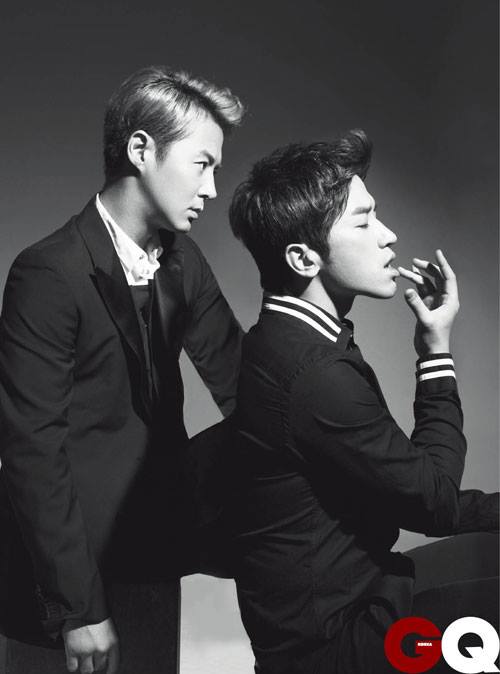 In the beginning of the review I mentioned how The Classic ended up in “the netherworld,” because it doesn’t place itself at the altar of most iconic K-pop albums, and it’s far from the land of mediocre. Yes, I have just spent over 2000 words elaborating on the merits and success of The Classic and indeed after all that, I am still insisting that The Classic is not going to become “a classic” in the general sense. The reason for that is as well done as this album is, it’s not much more than a solid pop album. It’s not breathtaking, innovative, or influential, nor is it going to make huge waves in Korean music that we’ll remember it for years after.
In the beginning of the review I mentioned how The Classic ended up in “the netherworld,” because it doesn’t place itself at the altar of most iconic K-pop albums, and it’s far from the land of mediocre. Yes, I have just spent over 2000 words elaborating on the merits and success of The Classic and indeed after all that, I am still insisting that The Classic is not going to become “a classic” in the general sense. The reason for that is as well done as this album is, it’s not much more than a solid pop album. It’s not breathtaking, innovative, or influential, nor is it going to make huge waves in Korean music that we’ll remember it for years after.
And honestly, it doesn’t need to be. Shinhwa is at a point in their careers where music show wins don’t matter, the press doesn’t matter, album sale records don’t matter and what I say or have said about them doesn’t matter either. I was very wrong about what The Classic attempts to allude to—it’s not a testament to its future place in musical history. The Classic is a testament to Shinhwa’s history; a musical journey through what Shinhwa has been and will be. Shinhwa is 15 years and running in the music industry, and they haven’t lost any of their energy or spunk in all of those years. In that context, The Classic is exactly where it needs to be; just another fantastic album among the many others that Shinhwa has, and probably will have in the future. In less verbose terms, The Classic embodies Shinhwa, not the other way around.
Rating: When dealing with an album like The Classic, I honestly think that a traditional rating is entirely irrelevant. So I’m not giving one besides this—
“Thirty-plus and Effortlessly Fabulous.”
